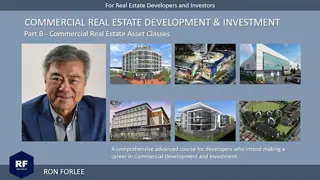
Commercial Real Estate Development and Investment – Part B
Commercial Real Estate Asset Classes
AYR International
Summary
- Reed courses certificate of completion - Free
Add to basket or enquire
Overview
Commercial real estate covers a broad range of asset types. The core commercial real estate types are offices, retail and industrial. However, there are many more. It also includes assets like healthcare, hotels, childcare centres, self-storage units with some blending into mixed-use developments. Each asset type has its own idiosyncrasies and this course delves into the asset’s details in order to ensure its financial success.
Over my 40-year career, I have undertaken a range of commercial developments, learning along the way, and improving my skills with each project. Some of these projects were my own while others were syndicated developments or working as an architect for other developers. The range and type included small neighbourhood to regional shopping centres, boutique office blocks, hotels and service stations. What I have learnt is that each type of asset class has its nuances but the key fundamentals remain the same, and that is researching what the market is looking for and then develop it according to the results of the research.
If you are considering commercial development as a career, it is, therefore, worthwhile learning and understanding the different types of commercial properties in the market. By understanding these asset types and their specific success factors, it will provide you with various options when looking at a potential development site. For example, a city retail centre could also include an office tower or a hotel, therefore providing a higher return on the land. When it comes to mixed-use developments, especially in urban infill locations, in it is worthwhile studying apartments under my course “residential asset classes”. Many councils see the city centre locations as a mix between retail and residential. Developers who have a good understanding of Commercial developments will be one step ahead of the competition.
Curriculum
-
Preface 02:45
-
1. Introduction 11:11
-
2. Office developments 1:29:16
-
3. Retail and shopping centre developments 1:32:34
-
4. Industrial real estate developments 1:13:10
-
5. Hotel and serviced apartment developments 1:19:40
-
6. Healthcare developments 1:06:44
-
7. Alternate commercial developments 1:20:19
-
8. Conclusion 22:23
Course media
Description
Part B of Commercial Real Estate Development and Investment focuses on specific Commercial Real Estate Asset classes. Under each asset type, whether it be Office, Industrial or Retail developments, the lecture covers a number of specifics from the underlying factors that creates the demand of the asset type, financing requirements and developing strategies for the best financial outcome plus tips on developing and investing. In addition, each class has a case study concluding with the lessons learnt. While this course is based within the Australian context, the development principles apply to many other countries as well.
What will you learn from this course?
- Learn the particulars of the various commercial developments and which one will suit your circumstances.
- How to be conversant and discuss the commercial property with industry experts
- Study the key success factors and development strategies of each asset class.
- How to undertake feasibility studies of each asset class
- How to finance each asset type through syndication or joint venture
- Learn about the future trends in commercial real estate
CURRICULUM
- Introduction
- Office developments
- Retail and shopping centre developments
- Industrial real estate developments
- Hotel and serviced apartment developments
- Healthcare developments
- Alternate commercial developments
- Conclusion
Who is this course for?
- Builders / General Contractors
- Professional Consultants (Architects, Engineers, Quantity Surveyors etc.)
- Real Estate Lawyers /Accountants
- Construction Project Managers
- Property Owners
- Landowners / Investors
- Real Estate Agents
- Finance Consultants
- Investment / Fund Managers
Requirements
- Microsoft Excel
- Microsoft Project Management
- Commercial Real Estate Development and Investment - Part A
Career path
Commercial Real Estate listed companies, Real Estate investment Trust and Commercial Developers are constantly looking experts in this sector. They offer various roles from analyst to development managers who can earn six-figure salaries or more.
Questions and answers
Currently there are no Q&As for this course. Be the first to ask a question.
Certificates
Reed courses certificate of completion
Digital certificate - Included
Will be downloadable when all lectures have been completed
Reviews
Currently there are no reviews for this course. Be the first to leave a review.
Legal information
This course is advertised on reed.co.uk by the Course Provider, whose terms and conditions apply. Purchases are made directly from the Course Provider, and as such, content and materials are supplied by the Course Provider directly. Reed is acting as agent and not reseller in relation to this course. Reed's only responsibility is to facilitate your payment for the course. It is your responsibility to review and agree to the Course Provider's terms and conditions and satisfy yourself as to the suitability of the course you intend to purchase. Reed will not have any responsibility for the content of the course and/or associated materials.


